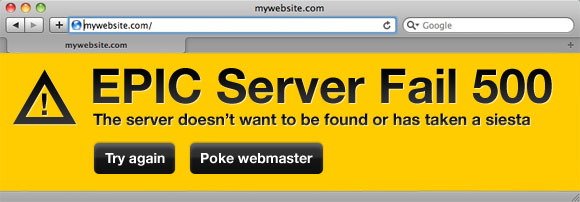
Downtime sucks. When your website is down, it might as well be invisible. That alone should be reason enough to monitor your website’s availability, but just to really push home this point, here are another 19 excellent reasons why you should monitor your website.
- All websites run into trouble from time to time. Murphy’s Law will make sure of that. There simply are too many things that can break a website, from server hardware issues to software issues to coding errors to network downtime to power outages to… The possibilities are, as the saying goes, endless.
- The sooner you know about a problem, the sooner you can fix it. Conversely, if you don’t know about a problem, you can’t fix it.
- It’s embarrassing when your users call you to let you know your site is down. You shouldn’t let your users or customers act as your monitoring. If they know before you do, that can easily get very embarrassing.
- Many web hosting companies won’t be upfront about site issues unless you have proof to back it up. (Other web hosts might thank you for bringing problems to their attention.)
- Think about your reputation. Outages are often discussed in public, and with less-than-kind words.
- Is your website becoming more or less stable over time? There is no way you can know that without monitoring.
- Stop guessing and assuming. By monitoring your website you arm yourself with actual knowledge instead of having to rely on guesswork and estimates. Get the facts straight.
- No alerts = calm waters and peace of mind. You will know if your website is working even if you’re on the road, at the beach, or simply away from your desk for a few hours. Besides, you don’t actually visit your website every minute of the day, do you?
- Your website may work for YOU, but what about the rest of the world? Network peering issues can cause widespread problems on the Internet.
- Ok, so your website was down. But WHY? A good monitoring service can help you find out.
- There is no “in the middle of the night” on the web. Downtime at night in your time zone is downtime during office hours in some other place.
- Your web host may have an uptime guarantee, but it is often just a network uptime guarantee. It doesn’t guarantee that your website or server will work, and those two you can screw up yourself by accident or by getting a spike in visitors.
- It doesn’t have to cost anything. There are free monitoring options out there, including a free trial from us here at Pingdom (pardon the shameless plug, but have a look at Pingdom.com/website-monitoring if you’re interested).
- It’s easy. Setting up monitoring isn’t rocket science, and with today’s online monitoring services you won’t need to install anything.
- It’s a tiny investment of time that will continue to pay off. You set it up once, and then it keeps running without any need for intervention from you, continuously testing your site for you. Look at it this way; if you can spend five minutes to do something that will alert you whenever you have site issues, all year round, that time is extremely well spent.
- Think of it as a cheap but effective insurance against embarrassingly long downtimes. It helps you as a webmaster to troubleshoot, and it helps keep your web host honest.
- You’ll have proof that you’re doing a good job. If you work with operations for a web service, you’ll have proof that you are doing well. Which leads us to…
- You can brag about your reliability. Has your site been up for two months straight? Be proud. Show your users your uptime numbers.
Considering the business we’re in, we here at Pingdom may be biased, but we strongly believe that all webmasters out there should monitor their sites. We wouldn’t be in this business otherwise, and we do know what we’re talking about.
Most responsible webmasters do backups. Those same webmasters should be just as careful about monitoring, because it’s just as important. (That was reason number 20, by the way. 😉 )



























